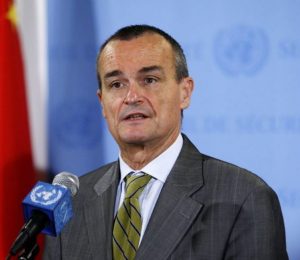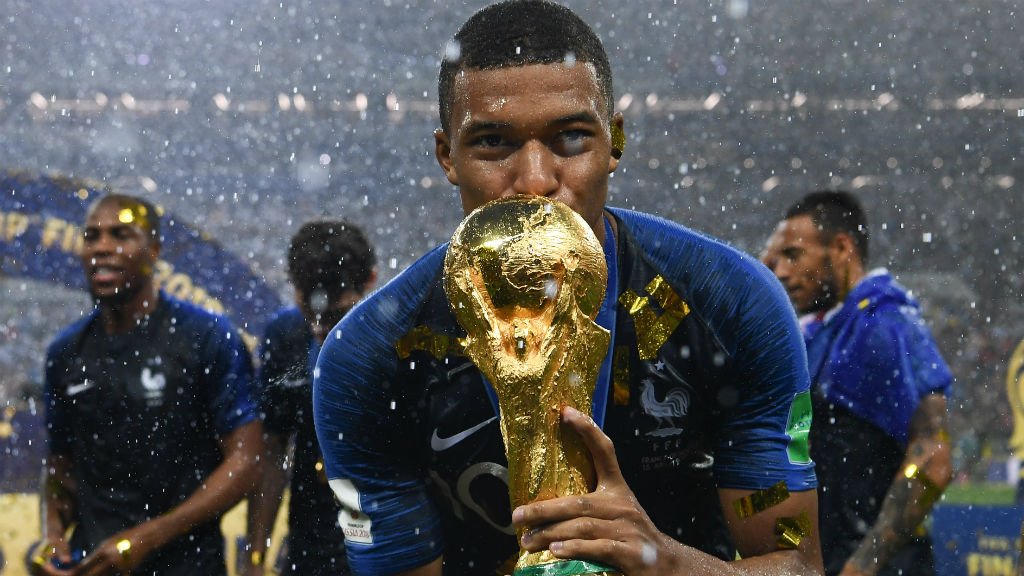The question of the identity of the footballers who won Russia 2018 for France has become the subject of a quarrel between a French ambassador and an American talk show host. More than half of the team have African blood in them even as they are French citizens and were playing for the French team in that outing. So, where are they from and by what criteria might we decide that in terms of truth? The fact of six of them being of African blood or the civilisational politics undergirding migration or multiculturalism or cosmopolitanism or dual citizenship? Well, here the French Ambassador to France says it is diversity. Trevor Noah says it is something else, all laid out in this piece by Rachel Donadio for The Atlantic which published it originally under the title “The French Don’t Understand American Identity Politics”

The author
If you were looking for a textbook example of the differences between how the United States and France think of themselves as multiethnic nations, look no further than the tiff this week between The Daily Show’s Trevor Noah and Gérard Araud, France’s ambassador to the United States. After France’s multiethnic national team won the World Cup, Noah joked on his show on Tuesday that “Africa won the World Cup.” Noah, who is a South African of mixed race, meant the line as a compliment—unlike some on the far right in France who over the years have criticized the team for having too many players of color.Join Now
Still, it upset Araud, a seasoned diplomat and avid Twitter user, who sent a letter of complaint, suggesting Noah had failed to understand that a person could be of African origin and French. (Note to the Quai d’Orsay: France is known around the world for many commendable qualities; sense of humor is not one of them.) Noah read Araud’s letter aloud on his show on Wednesday, during an eight-minute monologue that was a sophisticated riff on the questions and ironies of “hyphenated identities” in the United States, France, and beyond.
After Noah’s comments on the French national team, “I was shocked at how angry a lot of French people got,” Noah said Wednesday. Then he read Araud’s letter aloud, in a contrived French accent. “As many of the players have already stated themselves, their parents may have come from another country but the great majority of them, all but two out of 23, were born in France,” Noah read from Araud’s letter. “They were educated in France, they learned to play soccer in France, they are French citizens. They are proud of their country, France. The rich and various backgrounds of these players is a reflection of France’s diversity.” Here Noah paused. “Now that line here was interesting,” he said. “Now, I’m not trying to be an asshole, but I think it’s more a reflection of France’s colonialism.” The audience applauded and cheered. “They all have something in common. Like, all of those players, if you trace their lineages, it’s like ‘How did you guys become French?’ ‘How did your families start speaking French?’ Ooohh.”
Noah continued from the letter. “Unlike in the United States of America,” he read, to oohs from the audience, “France does not refer to its citizens based on their race, religion or origin. To us there is no hyphenated identity. Roots are an individual reality. By calling them an African team it seems you are denying their Frenchness. This even in jest legitimizes the ideology which defines whiteness as the only way of being French.”
 Let’s step back for a second. It’s hard to imagine Noah was trying to legitimize the notion that a person could not truly be French if she or he were of African descent. (It’s also hard to imagine him congratulating a U.S. sports team for an “African” victory either, although as Noah pointed out in the segment, context is everything, and who’s telling the joke matters.) Noah said he recognized that the French far right (he called them “Nazis”) had criticized the French team for having too many players of color, and said he obviously wasn’t endorsing that line.
Let’s step back for a second. It’s hard to imagine Noah was trying to legitimize the notion that a person could not truly be French if she or he were of African descent. (It’s also hard to imagine him congratulating a U.S. sports team for an “African” victory either, although as Noah pointed out in the segment, context is everything, and who’s telling the joke matters.) Noah said he recognized that the French far right (he called them “Nazis”) had criticized the French team for having too many players of color, and said he obviously wasn’t endorsing that line.
But the heart of the issue is the question of hyphenated identity, which is one of the biggest fault lines between France, and other European countries, and the United States when it comes to how individuals see themselves as members of the collective. In the United States, just about everyone’s hyphenated. In France, or among parts of the French establishment, the notion of communautarisme, American-style identity politics in which groups derive identity and clout from their backgrounds, is seen as anathema, an affront to the French ideal that all citizens are equal in the eyes of the state, as I’ve written about here. It’s a hard-won notion of citizenship that comes from a history in which the ancien régime was overthrown to create a modern French state.
It’s also an ideal—filled with ironies and inconsistencies that Noah could skewer in a way only an outsider to France could do. “My thing, coming from South Africa, coming from Africa, and even watching the World Cup in the United States of America, black people all over the world were celebrating the Africanness of the French players, not in a negative way but in a positive way: ‘Look at these Africans who can become French,’” Noah said. In a speech in South Africa this week, Barack Obama also praised the French team as a symbol of how diversity “delivers practical benefits.” “Not all these folks look like Gauls to me; they are French, they are French,” he said. (He might have been referring to former President Nicolas Sarkozy’s now infamous remarks that all French students should learn in school about “our ancestors, the Gauls.”)

Gerard Araud, Ambassador of France to the United States
But Noah pushed the point. Why the divide between African or French? “Why can’t they be both?” He continued: “I love those players, I love how African they are and I love how French they are,” he said. “That is what I love about America. America’s not a perfect country but what I love about this place is that people can still celebrate their identity in their Americanness.”
This, too, is a central fault line. France—and most of continental Europe—is still a place where third-generation citizens, products of immigration, are asked where they’re from, sent back to their origins, and at the same time sometimes criticized for not being “French” enough. It was interesting, Noah pointed out, that France’s embrace of its national team was different from how it embraces—or doesn’t embrace—African migrants to France. “When they are unemployed, when they may commit a crime or when they are considered unsavory, it’s the African immigrants,” Noah said. “When their children go on to provide a World Cup victory for France, we should only refer to them as French.”
He cited the example of Mamoudou Gassama, a Malian man who arrived in France illegally and whom Macron granted French citizenship after he scaled an apartment building to rescue a child stuck hanging from a balcony. “So is he now no longer African? Is that what you’re saying?” Noah said. “When he was on the ground, he was African, and then he climbed up and rescued the baby, then he’s French. So if he dropped the baby? ‘The African dropped the baby.’”
With amazing video footage, the Spiderman episode had gone viral, a feel-good story of a “good immigrant” who saves lives. Noah wasn’t the first person to point out the issue with it. When legal immigration to Europe is nearly impossible, the Spiderman case shows that “the bar for being a good immigrant is so high that you literally have to leap tall buildings in a single bound to meet it,” Nesrine Malik wrote of the incident in The New Statesman.
But in his rejoinder to Araud, Noah got at a deep issue in Europe, where immigration is testing and shifting national identities. When it comes to being African and being French, “if French people are saying they cannot be both, then I think they have a problem, not me,” Noah concluded. The audience applauded.
Still, Araud wasn’t satisfied. On Thursday morning he tweeted: “End of the argument with @Trevornoah. He didn’t refer to a double identity. He said ‘they are African. They couldn’t get this suntan in the south of France.’ i.e They can’t be French because they are black. The argument of the white supremacist.” This is a misreading of Noah’s argument, and of his original joke. It also cuts to the core of one of the biggest questions in Europe today: Who is allowed to define national identity—the state, or the citizens?




























